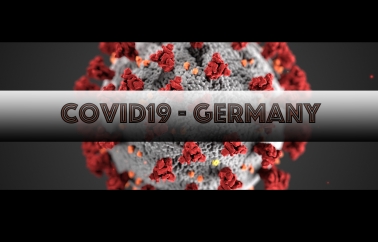
Feedback from Mr. SCHERER, Governor of Ortenaukreis, regarding the COVID19 crisis management
Crisis management and the role as STR
Crisis management COVID-19 – Ortenaukreis, Germany
Germany as a federal state has different entities to govern and manage the state. Each German federal state is divided into several administrative districts. As elected county governor of the Ortenau County, I am responsible for 429.479 citizens in an area of 1.861 km². The special location of the Ortenau County close to the border to France, especially the Alsace provides for different aspects to be kept in mind during the COVID-19 pandemic.
Organisational structures
Due to the federal structure of Germany, the competences are divided between the Federation, the federal states and the administrative districts and counties. The political bodies decide on the expertise and advice of national health experts.
Federation
Within the division of responsibilities in Germany’s federal system, in case of a pandemic the Federation plays a coordinating role, promoting a unified approach to fighting the pandemic and running public information campaigns, as well as making recommendations to the federal states. The National Pandemic Preparedness Plan is the basis for pandemic planning in Germany. The plan was adopted in 2017 by the Federation and the federal states and is updated regularly. The Robert Koch Institute is the federal health executive agency. It is responsible for coordination and information.
There are several crisis task forces:
- Joint crisis task force of the Federal Ministry of Health and the Federal Ministry of the Interior addresses operational issues and takes immediate action, for example implementing decisions made in the Federal Chancellor’s meetings, responding to requests from the federal states for assistance, and collecting and preparing data for situation reports.
- The Federal Chancellor meets on Mondays with the federal ministers of finance, foreign affairs, health, defence and the interior, and on Thursdays with all federal ministers responsible for the specific areas to be discussed. These groups assess the current situation, identify the general thrust of actions within the federal sphere of responsibility and monitor processes critical to success during the crisis.
- Representatives of the Federal Chancellery, the Federal Foreign Office, the Federal Ministry of Defence, the Federal Ministry for Economic Affairs and Energy and the Federal Ministry of Labour and Social Affairs also work with the joint crisis task force. It currently meets twice weekly. In line with the plan drawn up for this type of situation, the crisis task force is headed jointly by the Federal Ministry of the Interior and the Federal Ministry of Health represented by their State Secretaries.
In March 2020, the Parliament passed a bundle of legislation to enable the federal government to react on the current situation. One of it was the “Law to protect the population in the event of an epidemic situation of national importance”. In the event of such an epidemic, it temporarily gives the government additional powers to enable it to react more quickly in crisis management throughout Germany. At the same time, Parliament stated an "epidemic situation of national importance" - this is the prerequisite for the use of the authorization bases newly inserted into the Infection Protection Act. It concerns orders and regulations which the Federal Ministry of Health will be able to adopt directly in future. In addition to reporting obligations for passengers in international rail and bus transport, they concern in particular various measures for the procurement of medicines and protective equipment. The German Government provided quick, non-bureaucratic financial help wherever necessary. The Government implemented many measures and huge financial rescue systems for business and industry, including companies, self-employed, workers and many more. Help is also provided for families, schools and administrative units.
Another field of operation for the federal government is the freedom of movement. Due to this pandemic, the Federation set up border controls. The Ministry of State agreed with the neighbour states (Austria, France, Switzerland, Luxembourg, Denmark) on the temporary reintroduction of border controls as a measure to contain the spread of the novel coronavirus. Crossing the borders was only possible at some checkpoints and only for commuters.
The cross-border flow of goods will continue to be permitted. Cross-border commuters will also continue to be allowed to enter and leave the country. Travellers with no valid need for travel will not be permitted to enter/leave the country at the borders listed. This also applies to travellers with symptoms that could indicate infection with the coronavirus. In such cases, the necessary measures will be initiated in coordination with the health authorities.
Federal states
Each federal state has the right to decide upon the measures taken to fight against the pandemic. There are 16 pandemic preparedness plans, one in each federal state. They issue regulations and orders that deal with the handling of the pandemic situation. The federal states also set up financial rescue systems that are now harmonised and adjusted. As a basis, the Corona Regulation was issued in the beginning of the crisis and adopted to each development of the situation. Special regulations were issued for example on the conduct in this situation, on the protection on special-care homes and for people returning from other countries. Now the federal states issues rules for the reopening of schools, hairdressers, restaurants or hotels.
A special steering group “SARS-CoV-2” was set up by the federal government of Baden-Wurttemberg. It is the intersection between the federation, the federal state and local authorities in Baden-Wurttemberg and can react quickly to a changing situation. The steering group is where all the threads of state administration come together.
The Steering Group identifies the necessary needs for action by the state government and makes executive decisions based on the cabinet decisions. This enables the state government to react quickly and in a coordinated manner to various issues related to the pandemic.
Administrative Districts and Counties – in particular the Ortenaukreis
There is a pandemic preparedness plan for the administration to operate during a crisis. This is our guide to cope with the challenges. However, we analyse and adapt the measures on a daily basis. Due to the dynamic development, constant adaption is necessary.
A crisis steering group for the Ortenau County was set up. They meet on a regular basis to exchange on the developments and actions taken by the different units in charge. In the beginning, the participants met daily to be able to react to every new development.
Communication with the authorities
It is important to keep in touch with other authorities. The exchange between all levels is more important than ever. Therefore, I am in discussion and exchange with the mayors of the villages and cities within the Ortenau County. Regular conferences via phone or video are set up to keep the leaders of the local authorities informed. There are also conferences with the other county governors in Baden-Wurttemberg to exchange how to operate best in this situation. It is most important to find flexible solutions for general and individual challenges arising.
The vicinity to France and the long and trustful relationship is the reason I am in regular contact with my French colleagues.
Health department/public healthcare
As the Ortenau County has its own hospitals, in preparation of the situation we decided to close one site and gather the personnel in the remaining hospitals. The number of intensive care beds, the number of respiratory devices has been increased (from 39 before COVID-19 to 120 beds now) in our hospitals as in all hospitals in Germany. Special medical units such as fever ambulances and testing units were set up to cope with the COVID-19 patients.
On the basis of the recommendations of the federal health agency (Robert-Koch-Institut) and the ministries, our health department provides advice and information for institutions. There is a constant communication and contact with the State Health Authority, the Association of Statutory Health Insurance Physicians and the Ortenau county hospital. The colleagues provide coordination of actions concerning the administration and practical implementation. They develop guidelines based on the recommendations of the Robert-Koch-Institut for hospitals, special-care homes and give advice to the citizens.
According to the German Infection Protection Act, every positive test is reported to the health department of the region. On this basis, the department monitors the number of infected persons. A squad of persons who follow up the contact persons is working in shifts 7 days a week. With the identification of the persons who were in contact with infected persons the spreading should be contained. The focus is on testing persons with symptoms, the elderly, persons with pre-existing illness and persons in crucial positions such as medical personnel, nurses, doctors.
Personnel was urgently needed in the first period of the crisis. My authority organised 56 additional persons from within the county administration as well as from outside to support the health department.
The Ortenau County is not responsible to provide masks and protective clothing in the first place. However, we developed supply chains in the very early days of the pandemic. This enabled the County to provide protective equipment for different institutions and facilities and provide fast administrative assistance to cities and municipalities in the Ortenau County.
Decision making in the County council
At the beginning of the pandemic, there were no personal meetings with the County council. We decided on the following procedure to remain capable of taking actions on matters that could not be postponed. The meetings were prepared in the usual manner and invitations sent out with the note that according to the current state of affairs the meeting might be cancelled due to recommendations of the health department. If a cancellation of the meeting was still necessary one week before the date of the meeting, this was done by simultaneous invitation of the Council of Elders (in case of committee meetings also the respective spokespersons of the parliamentary groups) to a video conference. The chairpersons of the parliamentary groups (and, if applicable, the spokespersons of the parliamentary groups) were asked to contact their parliamentary groups prior to the meeting with regard to the individual agenda items. In the videoconference, all the items on the agenda were discussed individually according to whether or not the matter can be postponed. Agenda items were postponed –whenever possible- to a later meeting. The politically relevant items on the agenda were discussed in the conference with the chairpersons, with the tendencies in the parliamentary groups being taken into account via the group chairpersons (or group spokespersons). The urgent decisions made by the county governor were based on the outcome of the discussions in the conference. Any urgent decisions and their justifications were immediately communicated to the members of the bodies. This method enabled the county council to remain capable of taking action on matters with the greatest possible political feedback for urgent decisions and to react flexibly at any time, i.e. to return to normality as soon as the situation eases.
Service/Informing the citizens
Every day statistics are published on the development on the number of infections. We make them accessible to everyone on our homepage. We also inform about the number of recovered persons as well as about numbers of deceased persons. The statistics are very detailed to keep the residents informed.
Below is an example of development of infections since the start of COVId-19 in the Ortenau County in March 2020.

Red - infected persons in total; Green - infected persons at the moment; Orange - recovered persons; Black - deceased
We do a consequent and intense presswork using social media networks extensively. On our homepage, we offer a substantial list of FAQ’s and we have implemented a Chatbot on the topic to keep the public updated in realtime.
My authority offers a Corona hotline to support citizens with their questions and needs concerning COVID-19 as well as a hotline for psychological counselling. This new situation shows that citizens are faced with unknown sorrows and problems they cannot cope with.
We also support entrepreneurs and farmers in creating a platform where they can offer their products and services online. It is important to reach as many citizens as possible and find a balance in informing the citizens in a good way. The use of all digital means is very helpful to cope with this special situation.
Good luck to all my governor colleagues. I hope we will be able to meet soon again. Stay well!
Frank Scherer
Governor of Ortenaukreis



